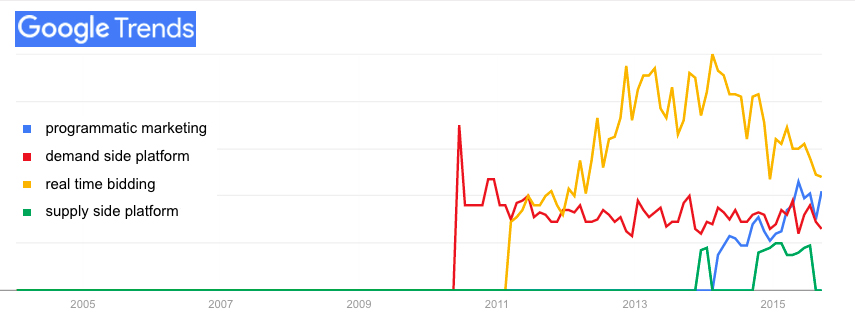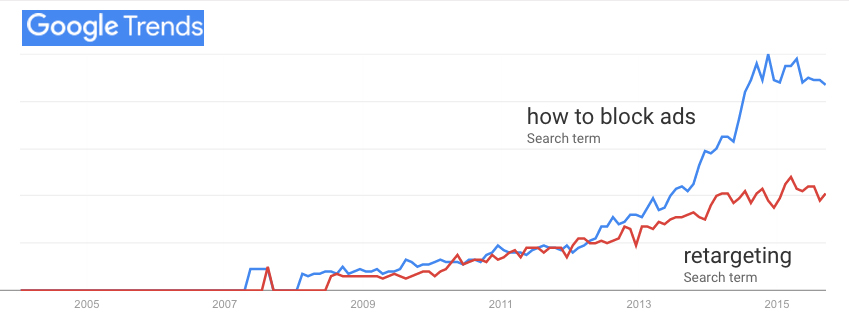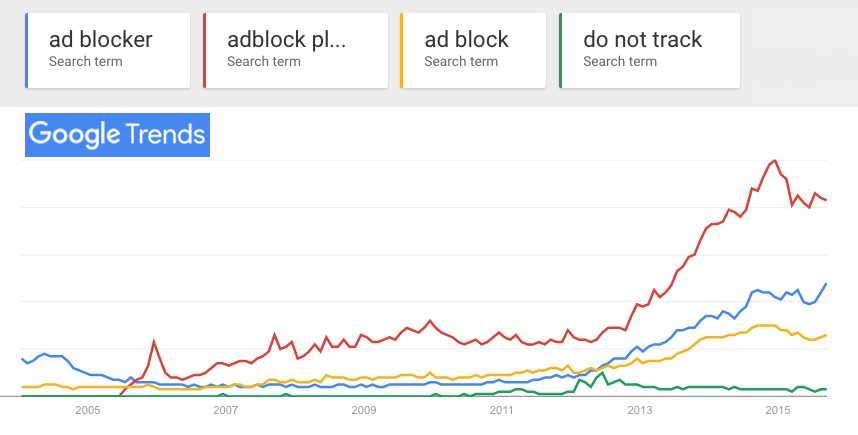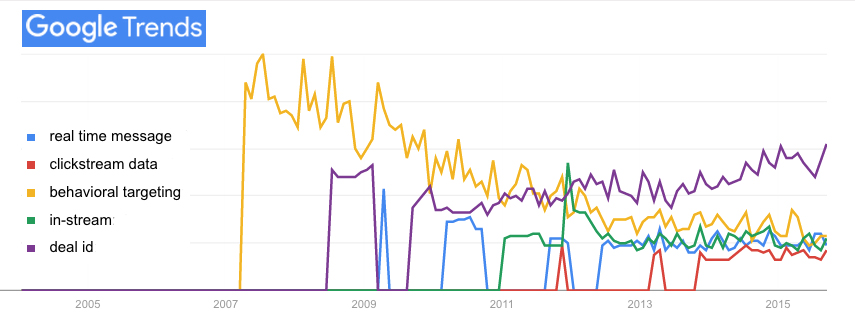According to Business Insider, ad blocking is now “approaching 200 million.”†
Calling it a boycott is my wife’s idea. I say she’s right. Look at the definitions:
Merriam-Webster: “to engage in a concerted refusal to have dealings with (as a person, store, or organization) usually to express disapproval or to force acceptance of certain conditions.”
Wikipedia: “an act of voluntarily abstaining from using, buying, or dealing with a person, organization, or country as an expression of protest, usually for social or political reasons. Sometimes, it can be a form of consumer activism.”
Free Dictionary: “To abstain from or act together in abstaining from using, buying, dealing with, or participating in as an expression of protest or disfavor or as a means ofcoercion.”
Close enough.
Ad blocking didn’t happen in a vacuum. It had causes. We start to see those when we look at how interest hockey-sticked in 2012. That was when ad-supported commercial websites, en masse, declined to respect Do Not Track messages from users:
As we see, interest in Do Not Track fell, while interest in ad blocking rose. (As did ad blocking itself.)
Leading up to this, from 2007 to 2011, advertisers and publishers cranked up tracking-fed advertising, aka “behavioral” advertising. Or, to the business itself, adtech.
Here are Google Trends searches for nine pieces of adtech arcana, none of which were in use before 2007:
 Add retargeting to that last one (note: you can’t search more than five terms at a time), and you get this:
Add retargeting to that last one (note: you can’t search more than five terms at a time), and you get this:
 Retargeting is the most obvious form of adtech. It’s how one ad shows up over and over again, at site after site, because some part of adtech’s collective brain (combining all the stuff trending in the graphs above, and more) decides to treat you like one of those enemies in a video game that has to be shot over and over again until it finally blows up. Not surprisingly, as retargeting started to rise, so did searches for “how to block ads”:
Retargeting is the most obvious form of adtech. It’s how one ad shows up over and over again, at site after site, because some part of adtech’s collective brain (combining all the stuff trending in the graphs above, and more) decides to treat you like one of those enemies in a video game that has to be shot over and over again until it finally blows up. Not surprisingly, as retargeting started to rise, so did searches for “how to block ads”:
 (Original source: Don Marti)
(Original source: Don Marti)
Finally, here’s adblock war, by itself:
 Google says data for September, at the right edge of that last chart, is partial. Given the media coverage going to adblock + war (and Apple’s support for “Content Blocking” in IOS 9), interest is sure to stay high.
Google says data for September, at the right edge of that last chart, is partial. Given the media coverage going to adblock + war (and Apple’s support for “Content Blocking” in IOS 9), interest is sure to stay high.
If we look at this war through the lens of GandhiCon…
- First they ignore you.
- Then they laugh at you.
- Then they fight you.
- Then you win.
…we’re at GandhiCon 3.
It is typical of business, even on the Internet (where everybody has power, and not just the big institutions), to think that ad blocking is a problem that affects only them, and that it’s up to them to fix it. (A new example: Secret Media.)
Actually, it’s up to us. Because we’ll win. Then we’ll find ourselves saying again what Cluetrain first said for us sixteen years ago:
we are not seats or eyeballs or end users or consumers. we are human beings and our reach exceeds your grasp. deal with it.
Deal is the operative verb here. Publishers and companies that advertise have power too, and we need to engage it, not just fight it. (In his speech at the UN today, President Obama had a good one-liner that applies here: “We all have a stake in each other’s success.”)
I describe one path toward engagement in A Way to Peace in the Adblock War, over on the ProjectVRM blog:
The only way engagement will work is through tools that are ours, and we control: tools that give us scale — like a handshake gives us scale. What engages us with the Washington Post should also engage us with Verge and Huffpo. What engages us with Mercedes should also engage us with a Ford dealer or a shoe store.
That path leads to a pair of related outcomes.
One is that ad blockers will evolve to valving systems for accepting advertising’s wheat while rejecting its chaff. (I explain the difference in the first post in this series. Also, sez AdExchanger, 71% of Ad-Block Users Would Consider Whitelisting Sites That Don’t Suck.)
The other is that we’ll help marketers think past abuse and coercion as ways to get what they want out of customers. After that happens, they’ll realize that —
- Free customers are more valuable than captive ones
- Genuine relationships are worth more than coerced ones
- Volunteered (and truly relevant) personal data is worth more than the kind that is involuntarily fracked
- Expressions of real intent by customers are worth more than guesswork fed by fracked data
And we’ll prove it to them. Because we’ll have the power to do that, whether they like it or not.
More on all this in my People vs. Adtech series.
† [Added 3 March 2019] The last numbers I could find on this were in 2017, and I reported on them here. They said 1.7 billion people were blocking ads online by that time. No doubt the boycott is at least as big today.


Leave a Reply